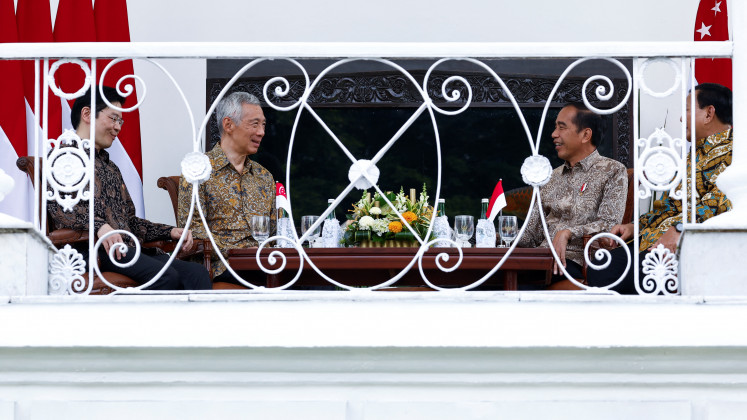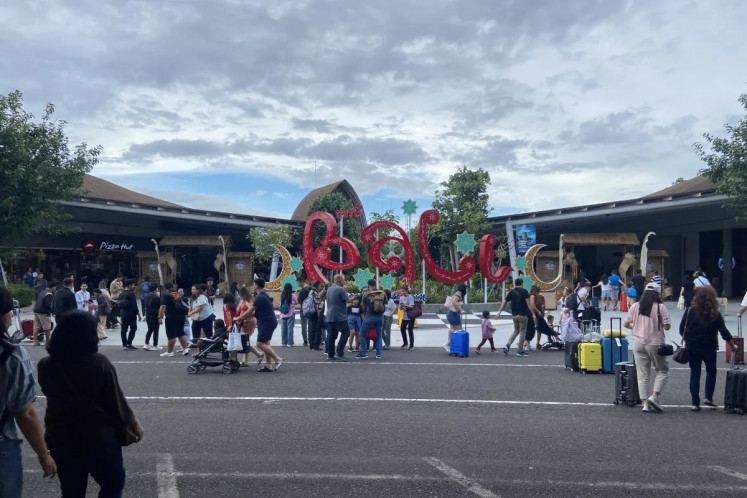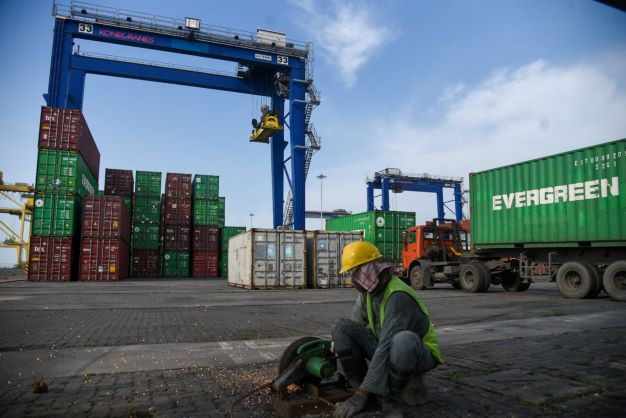Trade war good for Indonesia: VP Kalla
Rise to the occasion: Vice President Jusuf Kalla (right) and Coordinating Economic Minister Darmin Nasution attend the 2019 Indonesian Economic Outlook event in Jakarta on Tuesday
Change Size

R
ise to the occasion: Vice President Jusuf Kalla (right) and Coordinating Economic Minister Darmin Nasution attend the 2019 Indonesian Economic Outlook event in Jakarta on Tuesday. Kalla said the trade war between the United States and China could be an opportunity for Indonesia. (JP/Wendra Ajistyatama)
The Indonesian government is encouraging stakeholders to look at the bright side of the trade war between the United States and China, saying the global uncertainty could be beneficial for Indonesia as businesses relocate production facilities to circumvent US import restrictions.
Speaking at a seminar on the economic outlook for 2019, Vice President Jusuf Kalla pointed to the positive side of the trade war that had not been highlighted as much as its negative impacts.
Challenges stemming from the trade war, he said, went hand in hand with the opportunities, and Indonesia would not be able to solve them without giving the dispute a more critical look.
“Trade war is good, since it can [shift] exports from China toward other countries,” Kalla said on Tuesday. “If Vietnamese [industries] could boom because of that shift, why can’t we do the same?”
Indonesia, which relies on the two economic behemoths as its main trade partners, remains wary over the war, even though US President Donald Trump and China’s Xi Jinping agreed to call a 90-day truce during the G20 summit in Buenos Aires in early December.
In response to Kalla’s remarks, Industry Minister Airlangga Hartarto said the government had been striving to capture investment opportunities arising from the trade war to improve Indonesia’s slowing exports.
Non-oil and gas export growth in 2018 might only reach 7.5 percent, the Trade Ministry said on Monday, missing the 11 percent target, which was already below the 16 percent growth achieved in 2017.
During the seminar, Airlangga said the government had been in touch with various multinational companies that were considering to expand or relocate their production plants out of China as those companies attempt to escape rising tariffs.
“With the ongoing trade war, several manufacturers have announced plans to shift some of their orders to Indonesia,” Airlangga said.
“For instance, with the conclusion of the trans-Java toll road [project], there is going to be a new [industrial] zone in Batang, Central Java, that will house labor-intensive factories.”
Airlangga said the companies included US-based footwear company Nike, China-based Pegatron Corp. as well as Korean automaker Hyundai, in addition to undisclosed companies from Taiwan and European countries.
In late 2018, the government received news of a potential US$1 billion investment by Pegatron, a major assembler for Apple’s iPhone, to build a manufacturing site in Riau Islands, in addition to a Rp 12 trillion ($824.9 million) investment plan by Hyundai to build an Indonesian factory with an annual production capacity of 250,000 cars.
If realized the mulled investments would boost the local manufacturing industry, which accounts for more than 90 percent of Indonesia’s exports.
For example, said Airlangga, an additional production of 300,000 cars from the currently used capacity of 1.2 million could improve Indonesia’s automotive exports by 20 percent in 2019.
Nevertheless, luring manufacturers that are fleeing the trade war might not be as easy as the government thinks, according to an economic outlook published by the University of Indonesia’s Institute for Economic and Social Research (LPEM UI).
Indonesia, according to LPEM UI, needed to come up with more strategies to attract investment in order to get ahead of its Southeast Asian competitors, particularly Vietnam, Thailand and Malaysia.
Indonesia was not off to a good start this year, either, as the country slid by one position to the 73rd place on the World Bank’s Ease of Doing Business (EoDB) 2019 index, it added.
In the meantime, Airlangga said, the government would seek to add more value to its raw materials, particularly those from fisheries and the horticulture industry.
“We have established two horticultural industrial zones in Lampung that produce canned pineapple and Cavendish bananas,” Airlangga said, adding that the zones would be replicated in other regions of the country.
Coordinating Economic Minister Darmin Nasution said such efforts were in line with his vision to advance Indonesia’s export commodities through value addition and the use of technology.









